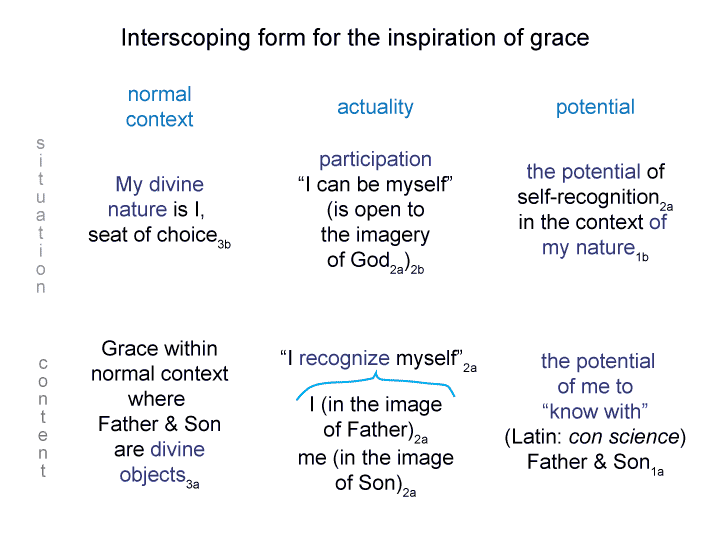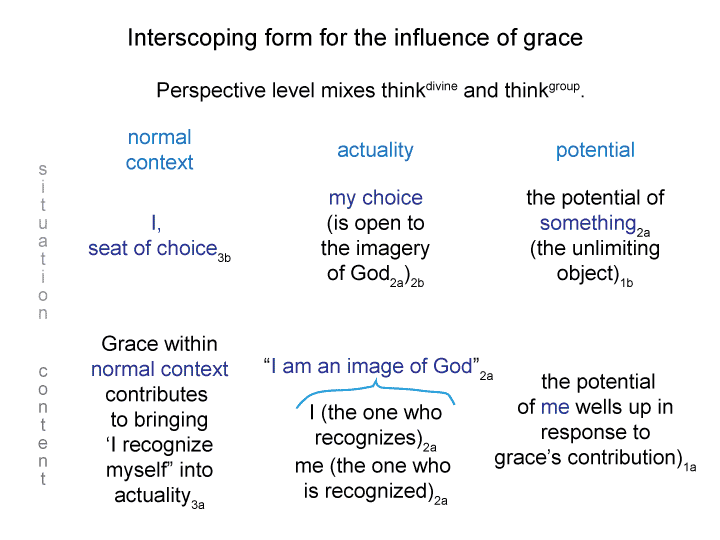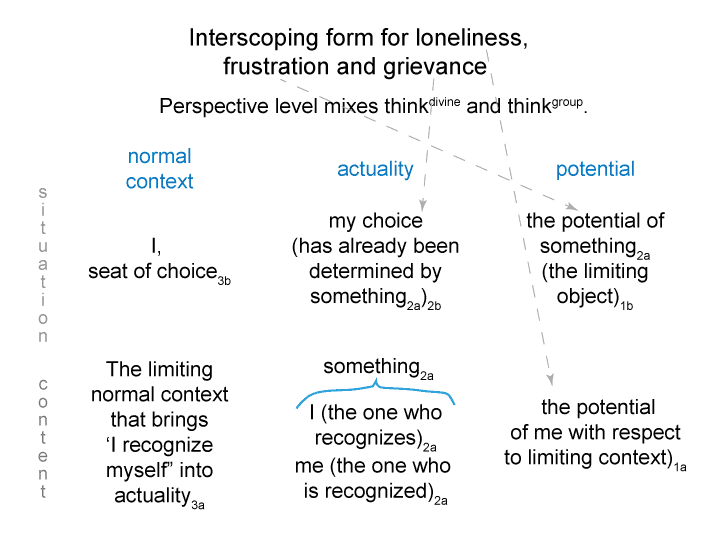Man and Sin by Piet Schoonenberg (1964) 2.1DG
[Why do I draw these two nested forms together?
I could say that, since God Recognizes Himself, and since we are created in the image of God, that I anticipate that human nature should participate in divine nature.
However, consider all other animals. Most animals (with few exceptions) do not recognize themselves in a mirror. They do not exhibit self-recognition. Their animal natures do not seem to hold divine attributes. However, they are not without recognition. They recognize what ‘they want to participate in’, ‘what they want to avoid’, and ‘what they can safely ignore’.
So, in as much as humans are animals, there is an analogy.
Animals participate in what they recognize.
So do humans.
Humans recognize divine nature.
Human nature is to participate in the divine nature.]
Man and Sin by Piet Schoonenberg (1964) 2.1DF
Summary of text [comment] pages 68 and 69
[When inspired by grace, ‘I recognize myself as an image of God.’ ‘Grace’, in its concreteness, yields recognition. I recognize myself in ‘the divine dyad of the Father and the Son’. ‘I’ parallels the Father. ‘Myself’ parallels the Son.
I want to connect this interscope to another interscope expressing:
Our human nature is to participate in the divine nature.]
Man and Sin by Piet Schoonenberg (1964) 2.1DD
Summary of text [comment] pages 68 and 69
‘Grace’, in its concreteness, is ‘my participation in another nature, that of the divine persons of the Father and the Son’.
[What is ‘grace, in its concreteness’?
I am not quite sure. It seems that grace goes with ‘thinkdivine in the perspective level (even when thinkdivine is occluded by thinkpro-object)’. It also seems that grace would go with ‘the immanence of the Holy Spirit in the anthropological relation in the dyad of objectrelation’.
Is grace somehow tied into the curious similarity between the situation and content levels of the interscoping form (of the thought experiment where ‘I choose something’) and the anthropological relation engendered by ‘God Recognizing Himself’?
Is ‘our human nature’ ‘to participate in the divine nature’?
In the next blog, the interscoping nested forms for ‘the thought experiment where ‘I choose something’ are presented.]
Man and Sin by Piet Schoonenberg (1964) 2.1DC-3
[For now, I leave this similarity unexplored, except to note:
Something2a is bound to ‘where I stand in relation to my perception of the spontaneous order (in which I am encompassed)2’.]
Man and Sin by Piet Schoonenberg (1964) 2.1DC-2
Summary of text [comment] pages 68 and 69
[At this point, I would like to compare the two recent images of the blog.
The first image is ‘self-esteem and spontaneous order’ (2.1 CY). The second image is ‘an interscoping form for loneliness, frustration and grievance’ (2.1 DB).
The situation and content levels of the interscoping forms (2.1 DB) in the prior blog appear curiously similar to the dyad of triadic relations in the limiting objectrelation (2.1 CY).
‘I, seat of choice3b,’ seems to parallel ‘regression and social justice as source of relation3’.
‘The fact that my choice has already been determined by my circumstances2b’ parallels ‘the design of social injustice and the structures that give advantage to that design2’.
‘The potential of the objectorganization to be the something that situates me1b’ parallels ‘the potential of economic and political power1’.
‘The limiting normal context that brings I recognize myself into actuality3a’ parallels ‘deprivation as an immanent relation3’.
‘The something that I recognize as myself 2a’ parallels ‘the dyad of the spontaneous order that calls itself into existence in the presence of an attractor and me knowing my place within that transient order2’.
‘The potential of me that wells up in response to the limiting normal context1a’ parallels ‘the potential of conditions to define self-esteem1’.
Man and Sin by Piet Schoonenberg (1964) 2.1DC-1
Summary of text [comment] pages 68 and 69
Does ‘the self-destruction of sin’ eliminate ‘the chance for fullness and meaning’?
The Scriptures say: Yes.
Man and Sin by Piet Schoonenberg (1964) 2.1DB-2
[The expert makes an assessment3a and says, “You lack self-esteem because of X, Y and Z.”
X, Y and Z3a limit the normal context that brings ‘I recognize myself’ into actuality.
That leaves me alone with X, Y and Z, even though the expert fashions prosthetics1a for me to cope with my limited normal context. The names of these prosthetics are many. The prosthetics are for my welfare1a. Or, so I believe.
What do I recognize in myself2a?
Something2a tells me how to recognize myself.
So I feel frustrated when that potential1b is situated by my capacity to choose3b.
So I am filled with grief2b.
My choice2b has already been determined something2a in the same way that my actuality is determined by my potential.
So the expert may now reap what “he” has sown by directing my grievance against the ones responsible for X, Y and Z.
I, the fool, do not realize that my loneliness, frustration and grievances derive from the expert, not the ones who are supposedly responsible.
After all, the expert brought me to realize that X, Y and Z determined my fate. Plus, the expert fashioned a little crutch for me to lean on.]



